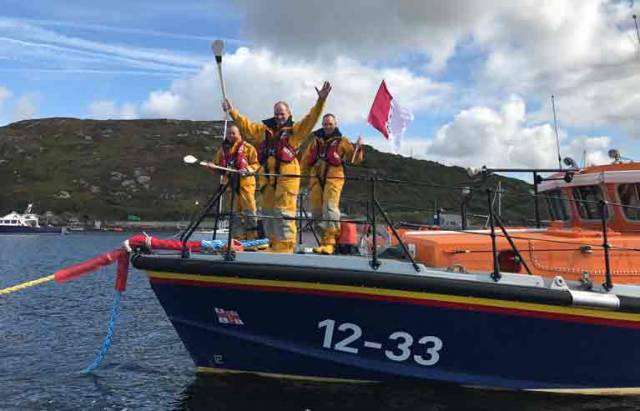Volunteer lifeboat crew at Clifden RNLI are celebrating the news that their all-weather lifeboat is to be permanently allocated at the Connemara lifeboat station following a successful trial which has seen 50 launches by the lifeboat crew and 32 people rescued or assisted. They are now hoping that their good luck rubs off on their fellow countymen this weekend and that the Galway hurlers bring home the Liam MacCarthy cup.
The RNLI and the GAA have announced a major partnership this year for the charity’s Respect the Water drowning prevention campaign aimed at sharing lifesaving advice and information through the sporting organisation’s clubs. In celebrating their good news, lifeboat crew from Clifden RNLI proudly flew the Galway colours in support of the county’s hurlers who are due to play Waterford in the All Ireland final.
The volunteer lifeboat crew first took ownership of an all-weather lifeboat in August 2014 when the Pride and Spirit was officially put on service and became a declared search and rescue asset for a trial period. The lifeboat operated alongside the two inshore lifeboats at the station. The decision followed an in-depth review of lifeboat cover in the area.
John Brittain, Clifden RNLI Lifeboat Operations Manager confirmed that the station had received word from the RNLI Trustees that the trial had been a success and the lifeboat will be made permanent.
‘The all-weather lifeboat has enabled us to provide lifesaving cover in all weathers up to 100 miles off the Connemara coast and it has complemented our inshore lifeboat service. During the trial period the all-weather lifeboat has enabled us to assist in and complete medical evacuations from the island of Inishbofin and Inishturk as well as providing assistance to a variety of boats and people in distress.
‘I would like to commend the dedication of our volunteer crew members here in Clifden who have devoted their time to ensure the period of change and training was a success. It is thanks to their efforts that we are now able to provide this service permanently to the Connemara community and to anyone who may find themselves in distress at sea.’
































































